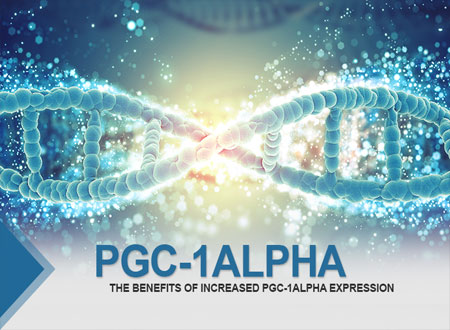

A short introduction to the gene PGC-1alpha: this is one of a number of genes of interest involved in the biochemical changes, resistance to age-related disease, and extended healthy life span brought about by calorie restriction (CR). It favorably changes the operation of mitochondria, and based on the effects of other genes and proteins involved in these mechanisms, I would expect enhanced expression of PCG-1alpha to have at least some modest beneficial effect on life span. That said, I’m not aware of any life span studies involving PCG-1alpha manipulation, but there is a fair amount of published research out there on its more immediate effects.
For a longer introduction, including some explanation as to why mitochondria are so important to aging and longevity, you might look back in the archives. Every gene and protein in the regulatory networks surrounding mitochondrial operation potentially determines some portion of the rate at which an individual ages:
Quote: Our understanding of the complexity of signalling pathways to and from the mitochondria is increasing, describing a network through which mitochondria may communicate functional status to the nucleus to impact cellular function. Metabolic reprogramming by CR may be central to the mechanism of lifespan extension, where changes in mitochondrial function confer an energetic shift that is conducive to increased cellular fitness, resulting in the promotion of longevity.

Here’s a recent paper demonstrating increased PGC-1alpha expression in mice to share a few more of the established benefits of calorie restriction:
Quote:Aging is a major risk factor for metabolic disease and loss of skeletal muscle mass and strength, a condition known as sarcopenia. Both conditions present a major health burden to the elderly population. Here, we analyzed the effect of mildly increased PGC-1alpha expression in skeletal muscle during aging. We found that transgenic MCK-PGC-1alpha animals had preserved mitochondrial function, neuromuscular junctions, and muscle integrity during aging. Increased PGC-1alpha levels in skeletal muscle prevented muscle wasting by reducing apoptosis, autophagy, and proteasome degradation.
The preservation of muscle integrity and function in MCK-PGC-1alpha animals resulted in significantly improved whole-body health; both the loss of bone mineral density and the increase of systemic chronic inflammation, observed during normal aging, were prevented. Importantly, MCK-PGC-1alpha animals also showed improved metabolic responses as evident by increased insulin sensitivity and insulin signaling in aged mice.
Our results highlight the importance of intact muscle function and metabolism for whole-body homeostasis and indicate that modulation of PGC-1alpha levels in skeletal muscle presents an avenue for the prevention and treatment of a group of age-related disorders.


I’m not so sure about that claim of reduced autophagy, given the importance of autophagy to mitochondrial function and the benefits of calorie restriction. The rest of it all fits into place with the changes observed in the metabolism of calorie restricted – and consequently longer-lived – mammals, however.
PQQ activates expression of PGC-1α (peroxisome proliferator-activated receptor gamma coactivator 1-alpha). PGC-1α is a “master regulator” that mobilizes your cells’ response to various external triggers. It directly stimulates genes that enhance mitochondrial and cellular respiration, growth, and reproduction. Its capacity to upregulate cellular metabolism at the genetic level favorably affects blood pressure, cholesterol and triglyceride breakdown, and the onset of obesity.
Watch Dr. Golding talk on Integrative and Anti-Aging Medicine.
Sign up for our newsletter to find out more about the exciting world of integrative medicine
